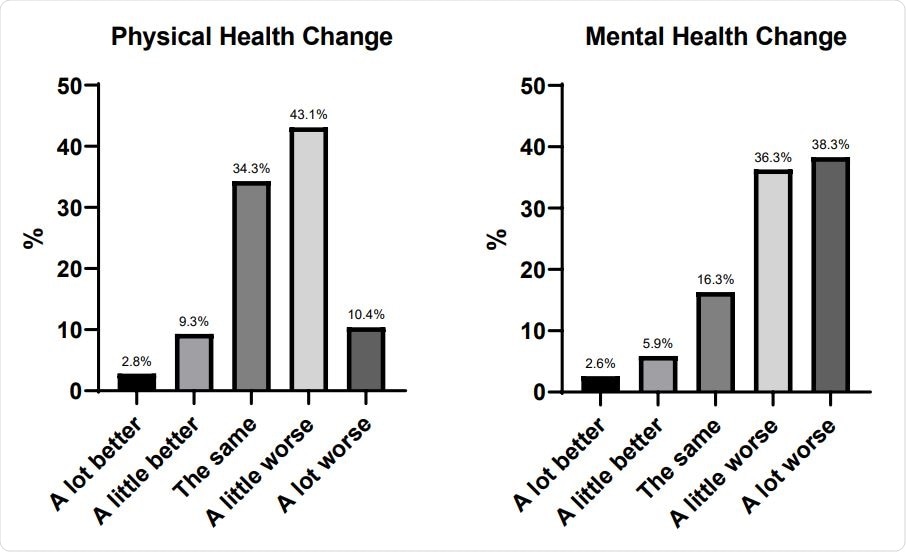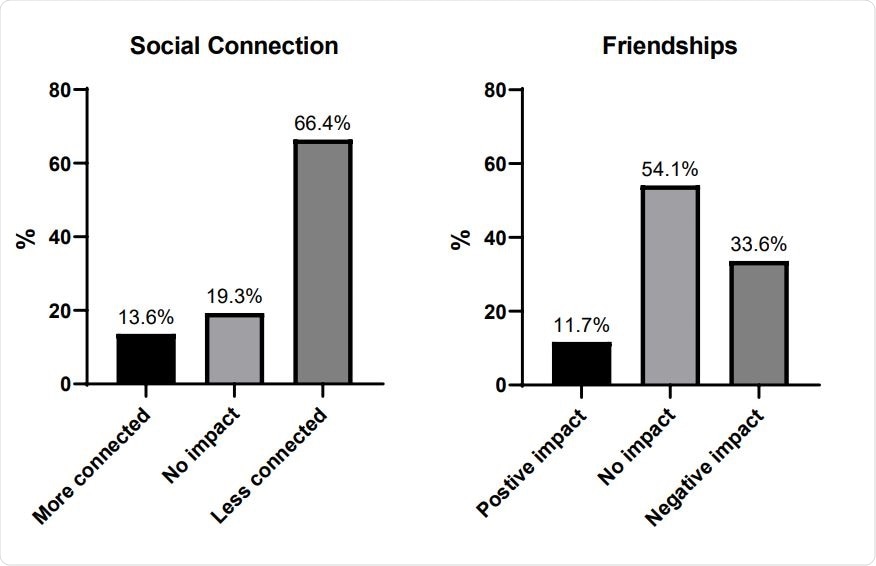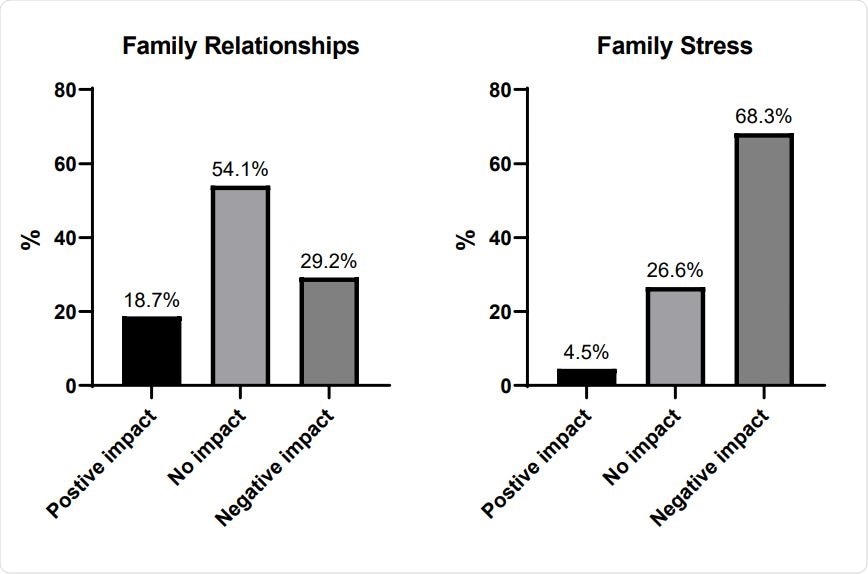The results of a survey administered to more than 700 adolescents (aged 12 to 18 years) revealed significantly elevated rates of psychological distress among this group, compared with pre-pandemic rates, and negative impacts on friendships, family relationships, and learning.
A significant proportion also reported exercising less and experiencing high levels of uncertainty about the future, sleeping difficulties, and a reduced sense of well-being.
Aliza Werner-Seidler and colleagues say the negative mental health impacts were worse among adolescents who had already experienced anxiety or depression in the past than among those who had not.
The team says the findings highlight the need for longitudinal research to assess the ongoing impacts of the pandemic on adolescents and the need for interventions to support young people through this disruptive time.
A pre-print version of the paper is available on the server medRxiv*, while the article undergoes peer review.

Physical and mental health change since the pandemic began
Few studies have investigated pandemic-related effects among adolescents
As the COVID-19 pandemic has continued to sweep the globe, concerns have been growing about the impact the related disruption is having on people’s mental health.
Various studies have reported increased psychological stress among most people, an effect that seems to be more severe among those with a history of mental health problems.
Although mental health problems have been reported across all ages, some studies have pointed to higher rates among young adults aged 18 to 24 years.

Peer relationships. Most respondents reported feeling less connected to their friends. There seemed to be a degree of stability to adolescents’ friendships, with about half of the sample reporting no overall impact on their friendships.
However, few studies have investigated the effect among adolescents, even though adolescence represents a period of social transformation where sensitivity to peer interaction, acceptance, and rejection is greater than during childhood or adulthood.
“Because of this sensitivity, it is likely that social distancing measures, together with school closures, may have a greater negative effect on adolescents,” writes the team.

Family functioning. Approximately one-third of respondents reported a worsening of family relationships, and most young people reported a worsening of family stress.
Using self-report surveys to assess the impact among adolescents
The team used online self-report surveys administered to 760 Australian adolescents during and after the peak of the COVID-19 outbreak (June-July 2020) to assess the psychological and lifestyle impact of the pandemic among this age group.
Overall, more than 75% were concerned about contracting the virus, and more than 85% engaged in behaviors such as social distancing and handwashing to reduce the risk of transmission.
Worryingly, around half of the study population reported a decline in their physical health, compared with before the pandemic began, and 75% reported a decline in their mental health.
Participants reported feelings of loneliness, which were associated with increased psychological distress and a reduced sense of well-being.
The researchers say that given the negative impact a lack of social connection has on social and cognitive development and how loneliness increases the risk of developing depression and other mental health problems, interventions need to focus on improving social connections, especially in areas where containment measures will be implemented for prolonged periods.
Negative impact of online learning
More than 95% of respondents reported engaging in online learning, and the majority said this had a negative impact on their mental health.
The team points out that “online learning requires a greater level of independence, motivation, and discipline than classroom learning, and these are skills which young people may not have fully developed.”
Increased stress among families
Most respondents reported that the pandemic had increased stress levels among their family members, and around half said it had affected a parent’s or carer’s employment.
The researchers say that given the need for adolescents to adjust to online learning and the need for parents to juggle managing their jobs with supporting their children’s learning, it is no surprise that this has been a stressful time for families.
Uncertainty, sleep disturbance and stress
Many respondents reported feeling uncertain about the future and experiencing higher levels of sleep disturbance and psychological stress.
The findings indicated that 48.3% of the participants were experiencing distress levels that were consistent with suspected mental illness.
Lower levels of exercise
More than 40% of respondents also reported exercising less since the pandemic began.
The team points out that the link between exercise and a reduced risk of depression and anxiety across all age groups is well documented.
“Given that even the strictest lockdowns in Australia have allowed for up to 1 hour of exercise per day, exercise could be promoted in public health campaigns as a means to prevent deteriorating mental health should the lockdown and period of restrictions continue,” writes the researchers.
Furthermore, exercise can also help to improve the quality and duration of sleep, they add.
Effects were more severe among those with a history of anxiety or depression
The effects on mental health were more severe among people who had previously been diagnosed with depression or anxiety than among people who had not.
Those with a history of depression or anxiety reported higher levels of loneliness, more trouble sleeping, more uncertainty about the future, greater levels of health anxiety, more psychological distress, and less sense of well-being.
Adolescents need mental health support during times of crisis
The researchers say that overall, the findings indicate that adolescents are experiencing high levels of disruption and psychological distress as a result of the current COVID-19 pandemic.
“Adolescents are already vulnerable to the onset of mental illness at this developmental stage, and the current research underscores the need to find rapid and accessible ways to support adolescent mental health during times of crisis,” write Werner-Seidler and colleagues
Furthermore, “there is a need for longitudinal research to evaluate the enduring effects of the pandemic on adolescents,” they conclude.

 This news article was a review of a preliminary scientific report that had not undergone peer-review at the time of publication. Since its initial publication, the scientific report has now been peer reviewed and accepted for publication in a Scientific Journal. Links to the preliminary and peer-reviewed reports are available in the Sources section at the bottom of this article. View Sources
This news article was a review of a preliminary scientific report that had not undergone peer-review at the time of publication. Since its initial publication, the scientific report has now been peer reviewed and accepted for publication in a Scientific Journal. Links to the preliminary and peer-reviewed reports are available in the Sources section at the bottom of this article. View Sources